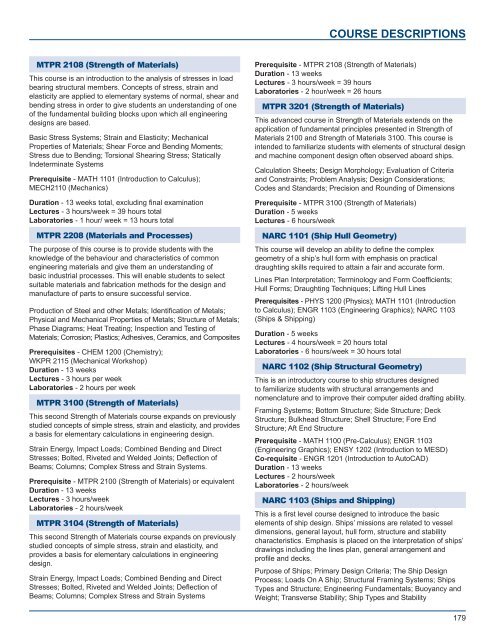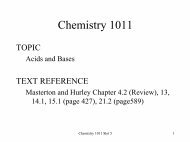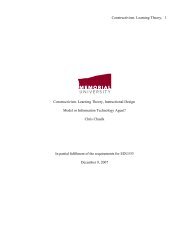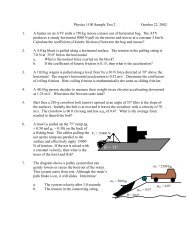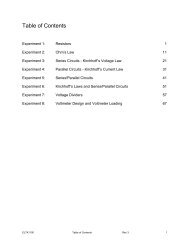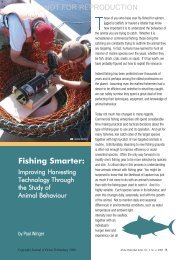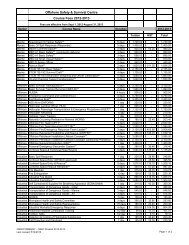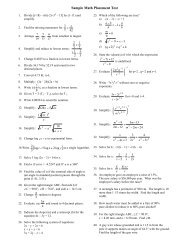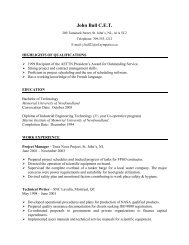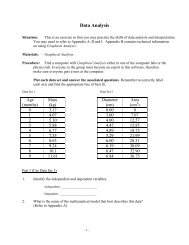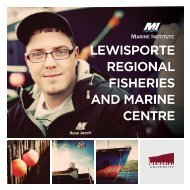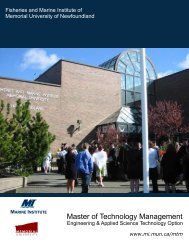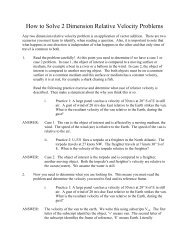Academic Calendar - Fisheries and Marine Institute - Memorial ...
Academic Calendar - Fisheries and Marine Institute - Memorial ...
Academic Calendar - Fisheries and Marine Institute - Memorial ...
You also want an ePaper? Increase the reach of your titles
YUMPU automatically turns print PDFs into web optimized ePapers that Google loves.
COURSE DESCRIPTIONS<br />
MTPR 2108 (Strength of Materials)<br />
This course is an introduction to the analysis of stresses in load<br />
bearing structural members. Concepts of stress, strain <strong>and</strong><br />
elasticity are applied to elementary systems of normal, shear <strong>and</strong><br />
bending stress in order to give students an underst<strong>and</strong>ing of one<br />
of the fundamental building blocks upon which all engineering<br />
designs are based.<br />
Basic Stress Systems; Strain <strong>and</strong> Elasticity; Mechanical<br />
Properties of Materials; Shear Force <strong>and</strong> Bending Moments;<br />
Stress due to Bending; Torsional Shearing Stress; Statically<br />
Indeterminate Systems<br />
Prerequisite - MATH 1101 (Introduction to Calculus);<br />
MECH2110 (Mechanics)<br />
Duration - 13 weeks total, excluding final examination<br />
Lectures - 3 hours/week = 39 hours total<br />
Laboratories - 1 hour/ week = 13 hours total<br />
MTPR 2208 (Materials <strong>and</strong> Processes)<br />
The purpose of this course is to provide students with the<br />
knowledge of the behaviour <strong>and</strong> characteristics of common<br />
engineering materials <strong>and</strong> give them an underst<strong>and</strong>ing of<br />
basic industrial processes. This will enable students to select<br />
suitable materials <strong>and</strong> fabrication methods for the design <strong>and</strong><br />
manufacture of parts to ensure successful service.<br />
Production of Steel <strong>and</strong> other Metals; Identification of Metals;<br />
Physical <strong>and</strong> Mechanical Properties of Metals; Structure of Metals;<br />
Phase Diagrams; Heat Treating; Inspection <strong>and</strong> Testing of<br />
Materials; Corrosion; Plastics; Adhesives, Ceramics, <strong>and</strong> Composites<br />
Prerequisites - CHEM 1200 (Chemistry);<br />
WKPR 2115 (Mechanical Workshop)<br />
Duration - 13 weeks<br />
Lectures - 3 hours per week<br />
Laboratories - 2 hours per week<br />
MTPR 3100 (Strength of Materials)<br />
This second Strength of Materials course exp<strong>and</strong>s on previously<br />
studied concepts of simple stress, strain <strong>and</strong> elasticity, <strong>and</strong> provides<br />
a basis for elementary calculations in engineering design.<br />
Strain Energy, Impact Loads; Combined Bending <strong>and</strong> Direct<br />
Stresses; Bolted, Riveted <strong>and</strong> Welded Joints; Deflection of<br />
Beams; Columns; Complex Stress <strong>and</strong> Strain Systems.<br />
Prerequisite - MTPR 2100 (Strength of Materials) or equivalent<br />
Duration - 13 weeks<br />
Lectures - 3 hours/week<br />
Laboratories - 2 hours/week<br />
MTPR 3104 (Strength of Materials)<br />
This second Strength of Materials course exp<strong>and</strong>s on previously<br />
studied concepts of simple stress, strain <strong>and</strong> elasticity, <strong>and</strong><br />
provides a basis for elementary calculations in engineering<br />
design.<br />
Strain Energy, Impact Loads; Combined Bending <strong>and</strong> Direct<br />
Stresses; Bolted, Riveted <strong>and</strong> Welded Joints; Deflection of<br />
Beams; Columns; Complex Stress <strong>and</strong> Strain Systems<br />
Prerequisite - MTPR 2108 (Strength of Materials)<br />
Duration - 13 weeks<br />
Lectures - 3 hours/week = 39 hours<br />
Laboratories - 2 hour/week = 26 hours<br />
MTPR 3201 (Strength of Materials)<br />
This advanced course in Strength of Materials extends on the<br />
application of fundamental principles presented in Strength of<br />
Materials 2100 <strong>and</strong> Strength of Materials 3100. This course is<br />
intended to familiarize students with elements of structural design<br />
<strong>and</strong> machine component design often observed aboard ships.<br />
Calculation Sheets; Design Morphology; Evaluation of Criteria<br />
<strong>and</strong> Constraints; Problem Analysis; Design Considerations;<br />
Codes <strong>and</strong> St<strong>and</strong>ards; Precision <strong>and</strong> Rounding of Dimensions<br />
Prerequisite - MTPR 3100 (Strength of Materials)<br />
Duration - 5 weeks<br />
Lectures - 6 hours/week<br />
NARC 1101 (Ship Hull Geometry)<br />
This course will develop an ability to define the complex<br />
geometry of a ship’s hull form with emphasis on practical<br />
draughting skills required to attain a fair <strong>and</strong> accurate form.<br />
Lines Plan Interpretation; Terminology <strong>and</strong> Form Coefficients;<br />
Hull Forms; Draughting Techniques; Lifting Hull Lines<br />
Prerequisites - PHYS 1200 (Physics); MATH 1101 (Introduction<br />
to Calculus); ENGR 1103 (Engineering Graphics); NARC 1103<br />
(Ships & Shipping)<br />
Duration - 5 weeks<br />
Lectures - 4 hours/week = 20 hours total<br />
Laboratories - 6 hours/week = 30 hours total<br />
NARC 1102 (Ship Structural Geometry)<br />
This is an introductory course to ship structures designed<br />
to familiarize students with structural arrangements <strong>and</strong><br />
nomenclature <strong>and</strong> to improve their computer aided drafting ability.<br />
Framing Systems; Bottom Structure; Side Structure; Deck<br />
Structure; Bulkhead Structure; Shell Structure; Fore End<br />
Structure; Aft End Structure<br />
Prerequisite - MATH 1100 (Pre-Calculus); ENGR 1103<br />
(Engineering Graphics); ENSY 1202 (Introduction to MESD)<br />
Co-requisite - ENGR 1201 (Introduction to AutoCAD)<br />
Duration - 13 weeks<br />
Lectures - 2 hours/week<br />
Laboratories - 2 hours/week<br />
NARC 1103 (Ships <strong>and</strong> Shipping)<br />
This is a first level course designed to introduce the basic<br />
elements of ship design. Ships’ missions are related to vessel<br />
dimensions, general layout, hull form, structure <strong>and</strong> stability<br />
characteristics. Emphasis is placed on the interpretation of ships’<br />
drawings including the lines plan, general arrangement <strong>and</strong><br />
profile <strong>and</strong> decks.<br />
Purpose of Ships; Primary Design Criteria; The Ship Design<br />
Process; Loads On A Ship; Structural Framing Systems; Ships<br />
Types <strong>and</strong> Structure; Engineering Fundamentals; Buoyancy <strong>and</strong><br />
Weight; Transverse Stability; Ship Types <strong>and</strong> Stability<br />
179


